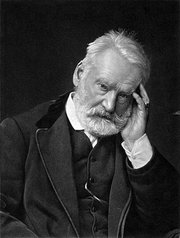Victor Hugo
|
|
Victor-Marie Hugo (February 26, 1802 – May 22, 1885) was a French author, the most important of the Romantic authors in the French language. His major works include the novels The Hunchback of Notre Dame and Les Misérables, and a large body of poetry.
| Contents |
Life and work
Hugo was born in Besançon, Doubs in the region of Franche-Comté. He lived in exile during the reign of Napoleon III - in Jersey 1852-1855 and in Guernsey from 1855 until his return to France in 1870.
Although Hugo is better known to the English-speaking world as a novelist, it was as a poet that he broke new ground. The French poetic traditions were as well-established in his time as the English ones were before the time of the Romantic poets, and Hugo's contribution may be compared with that of Wordsworth. He believed that the poet's purpose should be two-fold:
- To echo universal sentiment by revealing his own feelings, uniting the voices of mankind, nature and history.
- To guide the reader: "faire flamboyer l'avenir" - to lead the way.
In his epic, La Légende des Siècles, he attempts, by reference to historical events, to depict humanity's struggle to emerge from obscurity into enlightenment.
The term 'United States of Europe' (États-Unis dEurope), made famous in the 20th century by Winston Churchill and the European Union, was in fact first used by Victor Hugo, at the International Peace Congress held in Paris in 1849 and during speeches at the French National Assembly, including those on September 4 1869 and March 1, 1871.
Hugo was the Honorary President and founder of the Association Littéraire et Artistique Internationale (ALAI) in 1878 in Paris which gave itself the objective of creating an international convention for the protection of literary and artistic properties which was achieved eight years later with the Berne Convention on September 9, 1886.
Hugo died in Paris on May 22, 1885. His life, and the spontaneous national mourning which followed, inspired the French government to reinvent the Panthéon in Paris as a temple in homage to the great men (and, eventually, women) of France. He is buried in its necropolis.
Hugo also became one of the three primary saints worshipped in the Vietnamese religion Cao Dai.
Bibliography
(in French)
Published during lifetime
- Nouvelles Odes (1824)
- Bug-Jargal (1826)
- Odes et Ballades (1826)
- Cromwell (1827)
- Les Orientales (1829)
- Le Dernier jour d'un condamné (1829)
- Hernani (1830), (this play is the source for Verdi's opera Ernani) — at the time this drama was staged, it was so insurrectionist in style and content that it caused nightly riots at the Comédie Française.)
- Notre-Dame de Paris (1831), (The Hunchback of Notre Dame)
- Marion Delorme (1831)
- Les Feuilles d'automne
- Le Roi s'amuse (1832)
- Lucrèce Borgia (1833)
- Marie Tudor (1833)
- Étude sur Mirabeau (1834)
- Littérature et philosophie mêlées (1834)
- Claude Gueux (1834)
- Angelo (1835)
- Les Chants du crépuscule (1835)
- Les Voix intérieures (1837)
- Ruy Blas (1838)
- Les Rayons et les ombres (1840)
- Le Rhin (1842)
- Les Burgraves (1843)
- Napoléon le Petit (1852)
- Les Châtiments (1853)
- Lettres à Louis Bonaparte (1855)
- Les Contemplations (1856)
- La Légende des siècles (1859)
- Les Misérables (1862), (on which the very successful musical of the same name is based)
- William Shakespeare (essay) (1864)
- Les Chansons des rues et des bois (1865)
- Les Travailleurs de la Mer (1866), (Toilers of the Sea)
- Paris-Guide (1867)
- L'Homme qui rit (1869), (The Man Who Laughs)
- L'Année terrible (1872)
- Quatrevingt-treize (1874)
- Mes Fils (1874)
- Actes et paroles — Avant l'exil (1875)
- Actes et paroles - Pendant l'exil (1875)
- Actes et paroles - Depuis l'exil (1876)
- La Légende des Siècles 2e série (1877)
- L'Art d'être grand-père (1877)
- Histoire d'un crime 1re partie (1877)
- Histoire d'un crime 2e partie (1878)
- Le Pape (1878)
- Religions et religion (1880)
- L'Âne (1880)
- Les Quatres vents de l'esprit (1881)
- Torquemada (1882)
- La Légende des siècles Tome III (1883)
- L'Archipel de la Manche (1883)
Published posthumously
- Théâtre en liberté (1886)
- La fin de Satan (1886)
- Choses vues - 1re série (1887)
- Toute la lyre (1888)
- Alpes et Pyrénées (1890)
- Dieu (1891)
- France et Belgique (1892)
- Toute la lyre - nouvelle série (1893)
- Correspondances - Tome I (1896)
- Correspondances - Tome II (1898)
- Les années funestes (1898)
- Choses vues - 2e série (1900)
- Post-scriptum de ma vie (1901)
- Dernière Gerbe (1902)
- Mille francs de récompense (1934)
- Océan. Tas de pierres (1942)
- Pierres (1951)
Online texts
Template:Wikiquote Template:Wikisource author Template:Commonscat Peni dougs
- Les Misérables online (http://www.online-literature.com/victor_hugo/les_miserables/)
- The Hunchback of Notre Dame online (http://www.online-literature.com/victor_hugo/hunchback_notre_dame/)
- E-texts of some of Hugo's works from various sources (http://onlinebooks.library.upenn.edu/webbin/book/search?amode=start&author=Hugo%2c%20Victor)
- E-texts of Hugo's work, contemporary and modern reviews, and biographical material (http://www.gavroche.org/vhugo/)
- Political speeches by Victor Hugo: Victor Hugo, My Revenge is Fraternity! (http://www.ellopos.net/politics/eu_hugo.html)
- Biography and speech from 1851 (http://www.spartacus.schoolnet.co.uk/EUhugo.htm)
- Victor Hugo Central (http://www.gavroche.org/vhugo/sitemap.shtml)
| Preceded by: Népomucène Lemercier | Seat 14 Académie française | Succeeded by: Charles Leconte de Lisle |
cs:Victor Hugo cy:Victor Hugo da:Victor Hugo de:Victor Hugo et:Victor Hugo es:Victor Hugo eo:Victor HUGO fr:Victor Hugo ko:빅토르 위고 it:Victor Hugo he:ויקטור הוגו nl:Victor Hugo ne:Victor Hugo ja:ヴィクトル・ユーゴー no:Victor Hugo pl:Victor Hugo pt:Victor Hugo ro:Victor Hugo ru:Гюго, Виктор Мари sr:Виктор Иго fi:Victor Hugo sv:Victor Hugo tr:Victor Hugo zh:维克多·雨果

